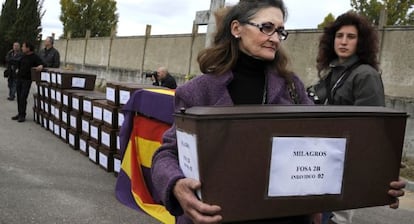A 77-year wait to lay the past to rest
The families of 129 people executed during the Civil War finally say goodbye But DNA identification was impossible due to government's funding squeeze


On successive nights between July and October 1936, different men with the same uniform, all members of the Falange, would come to their homes to seek them out. Their families witnessed the kidnappings, knowing they would never see their loved ones again. They would be "disappeared."
But a team of archeologists led by forensic investigator Francisco Etxeberria found them 70 years later - practically a lifetime - in four mass graves around Aranda de Duero, in Burgos province. The first was opened in 2003 and the last in 2012. Inside were the remains of 129 people executed during the Spanish Civil War, and last weekend, they were finally laid to rest by their descendants. However, only a dozen of the deceased were formally identified by DNA tests because funds for such investigations have been cut off.
"The government now won't give a single euro to the search for victims of Francoism," said José Ignacio Casado, from the Association for the Recovery of Historical Memory (ARMH).
Children, grandchildren and siblings solemnly handed the small caskets along a human chain to a tomb in the cemetery at Aranda de Duero, without knowing which ones contained members of their own families. The deceased joined 300 others who were killed by Nationalist forces.
We invited the prime minister and the justice minister, but they didn't come"
"The important thing is that Inocencio is no longer in a ditch and has his name on a headstone," said Luis Gonzalo Martínez of his father's cousin. "He was only 16... They killed him to seek revenge on his father, who was disabled and a great friend of the Socialists and labor unions in the area."
The victims, 128 men and a woman, were between 16 and 70 years of age. They worked in the fields, on the railways, in factories and small businesses. What united them was what eventually killed them: they were all sympathetic to the Republican cause. "Killed by fascism in their fight for the defense of democracy and freedom," reads the memorial.
There were no guests of officialdom at the ceremony except Popular Party (PP) deputy Máximo López. "We invited the prime minister and the justice minister, but they didn't want to come. We can see that [Justice Minister Alberto Ruiz-]Gallardón prefers martyrs of the crusade than these 129, who were martyrs of liberty and democracy," said José María Rojas of the ARMH.
The Law of Historical Memory, introduced by the previous Socialist administration, provided grants to family associations seeking their loved ones but the PP government of Mariano Rajoy rescinded the aid shortly after coming to power in 2011 because, it said, of the recession.
However, the ARMH and other groups are not prepared to let the flame lit by suspended High Court Judge Baltasar Garzón's attempt to prosecute Civil War crimes flicker out. In a 2008 universal justice suit Garzón presented a list of 114,000 counts of forced disappearances, and a UN mission to Spain last month reminded the government of its "international obligations," noting that the search for victims of the Franco regime was not a burden that families should have to shoulder but rather "an obligation of the Spanish state."
Separately, the Socialists and the United Left grouping have presented a resolution in Congress to locate and open all mass graves in Spain within a period of two years and called for the installation of a truth commission of independent experts, an instrument that the United Nations recommends for countries that have been involved in similar conflicts - 40 nations over the past 30 years have used truth commissions to compensate victims of forced disappearance.
In the cemetery at Aranda, flowers were laid on All Saints Day in remembrance of the 129. With government funding stopped, there are still families of 113,000 other disappeared who have no place to do likewise.
Tu suscripción se está usando en otro dispositivo
¿Quieres añadir otro usuario a tu suscripción?
Si continúas leyendo en este dispositivo, no se podrá leer en el otro.
FlechaTu suscripción se está usando en otro dispositivo y solo puedes acceder a EL PAÍS desde un dispositivo a la vez.
Si quieres compartir tu cuenta, cambia tu suscripción a la modalidad Premium, así podrás añadir otro usuario. Cada uno accederá con su propia cuenta de email, lo que os permitirá personalizar vuestra experiencia en EL PAÍS.
¿Tienes una suscripción de empresa? Accede aquí para contratar más cuentas.
En el caso de no saber quién está usando tu cuenta, te recomendamos cambiar tu contraseña aquí.
Si decides continuar compartiendo tu cuenta, este mensaje se mostrará en tu dispositivo y en el de la otra persona que está usando tu cuenta de forma indefinida, afectando a tu experiencia de lectura. Puedes consultar aquí los términos y condiciones de la suscripción digital.








































